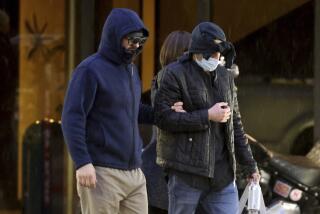‘Oligarch’ exile questioned
- Share via
LONDON — Exiled Russian “oligarch” Boris Berezovsky, a prominent critic of the Kremlin who has fought extradition to his country for years, agreed to be questioned here Friday by a Russian investigator examining the killing of former KGB agent Alexander Litvinenko.
The outspoken billionaire has been waging a free-spending campaign to unseat President Vladimir V. Putin, whose government he believes is behind Litvinenko’s death.
Berezovsky, who faces fraud charges in Russia, was interviewed in the presence of British detectives at Scotland Yard. He agreed to meet only if the Russian investigator was checked for weapons and poisons, the session was conducted at a British police facility and a recording of the interview was provided.
He has said he would meet with them, after years of refusal to talk with Russian law enforcement authorities, to prevent them from having an excuse to forbid British detectives from questioning suspects in Russia in the Litvinenko case. Litvinenko, a friend of the tycoon, died in London in November after exposure to a massive dose of radioactive polonium-210.
“Boris thought he should do it, not because he wants to give any credence to the Russian so-called investigation, which he considers a sham and an obstruction of justice, but because he doesn’t want to give the Russians an excuse to hamper the British investigation,” said Alex Goldfarb, a Berezovsky spokesman who heads his International Foundation for Civil Liberties.
Goldfarb is co-writing a book on Litvinenko’s death with the former spy’s widow, Marina Litvinenko, who refused to be interviewed by the Russian authorities.
British police already have traveled to Moscow to conduct interviews in the investigation, which they have handed over to prosecutors in London. Additional inquiries are still underway.
Berezovsky, who has been granted political asylum in Britain, says agents of the Russian government were behind the killing, but some in Russia suspect Berezovsky.
Alexander Litvinenko’s friends and family in London believe agents of the Russian government organized the poisoning in retaliation for his defection from the Federal Security Service, a successor agency of the KGB, and for his repeated allegations of government corruption and criminal acts committed against Russian citizens.
Two fellow former KGB agents who were visiting Litvinenko in London on the day of the poisoning have been linked to the physical trail of polonium, though they have not been officially identified as suspects and the British authorities have not issued any arrest warrants.
The Russian investigators “are out to create a virtual case, which will be a mirror image of the British case,” Goldfarb said. “In the end, they will say Berezovsky is the one who did it, and they will use this as a reason not to extradite [to Britain] the true perpetrators.
“This is all a cover-up. The Russians are trying to get away with murder. And it all goes round to the fact that nobody in the West will have the guts to call them a terrorist government.”
Berezovsky told the Russian news agency RIA Novosti that he met with a Russian investigator for four hours.
“I had the impression that he [the investigator] was a tax inspector or a major Russian bank representative, who wanted to learn where my and my family’s accounts were and what fortune Alexander Litvinenko had, how much he had in his account and who will inherit his fortune,” Berezovsky said.
He said he believed the Russian investigative team had sought to interview about 100 witnesses in Britain, but only three agreed.
Russian detectives also reportedly questioned another Russian exile who has sought asylum in Britain, Chechen resistance spokesman Akhmed Zakayev, wanted in Russia on charges connected to the war in Chechnya.
Zakayev also was a friend of Litvinenko and has accused the Russian government of involvement in his poisoning.
Berezovsky, one of several so-called oligarchs who became billionaires overnight during Russia’s transition to a market economy in the 1990s, fled the country in 2000. Authorities there have been seeking to prosecute him on a variety of fraud and embezzlement charges in connection with his former business holdings.
Russian Prosecutor General Yuri Chaika told reporters in Moscow on Thursday that his deputy, Alexander Zvyagintsev, was heading the team of investigators in London.
“So far, we have not encountered any difficulties. It is hard to speak about any deadlines because everything is decided by the U.K. side,” he said, according to the Interfax news agency.
Igor Korolkov, a correspondent for the Russian newspaper Novaya Gazeta, said it was unlikely that Russian prosecutors expected to get any new evidence on the Litvinenko case from Berezovsky.
“They are just going through the motions of pretending to conduct the investigation they launched, and at the same time do their best to distract attention from Russian spies so heavily implicated in the case already,” Korolkov said. “At the same time, they are taking advantage of this opportunity to apply pressure on Berezovsky, and thus imply that the trade for his extradition with the British side is still in the works.”
Times staff writer Sergei L. Loiko in Moscow contributed to this report.
More to Read
Sign up for Essential California
The most important California stories and recommendations in your inbox every morning.
You may occasionally receive promotional content from the Los Angeles Times.










